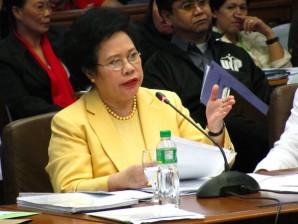
Senator Miriam Defensor Santiago stresses a point during Friday’s Senate hearing. MATIKAS SANTOS/INQUIRER.net
MANILA, Philippines—Senator Miriam Defensor-Santiago disclosed on Friday that money from “jueteng” amounts to an estimated P30 billion annually and the illegal numbers game operates openly in at least six cities in Metro Manila and in nearby provinces.
Santiago, head of the committee on constitutional amendments and revisions on codes and laws, said during the hearing that one percent of the revenues was given to the Department of Interior and Local Government (DILG) secretary or undersecretary, the Philippine National Police (PNP) chief, and the Criminal Investigation and Detection Group (CIDG) head.
The Senate inquiry was investigating resigned interior undersecretary Rico Puno, who was allegedly among the top government officials receiving protection money from “jueteng” lords.
Puno denied having any knowledge of protection money from “jueteng” lords being given to government official.
“Jueteng is still rampant. I said in 2010 that the system during that time was one percent will be paid [to the three government officials] and I gave the media a ballpark figure of P30 billion being earned yearly through jueteng,” Santiago said.
She said that, based on figures obtained in 2010 from “confidential agents,” in Metro Manila, which has 16 cities, “six have jueteng in full view of the public: Quezon City, Makati, San Juan, Manila, Pasay, Mandaluyong,” Santiago said.
The local governments were “tolerating jueteng, in the sense that they [jueteng operators] never get arrested,” she said.
Santiago added that in Central Luzon, the provinces of Bataan, Nueva Ecija, Pangasinan, Bulacan, Zambales, and Pampanga have jueteng. In Region 4-A (Calabarzon), the provinces of Laguna, Batangas, Cavite, and Quezon also have jueteng.
Laguna has the biggest gross receipts at P14 million daily income from jueteng, Santiago said, adding that Pampanga and Pangasinan have P9 million, P8.5 million for Batangas, P8 millioin for Bulacan, and P7.5 million for Nueva Ecija and Quezon.
From the total gross receipts, 34 percent would be deducted as operational expenses while the remainder will be split on the national level with “one percent of the net earning goes to the syndicates consisting of the DILG secretary or undersecretary, PNP chief, and CIDG head, etc.,” Santiago said.
She described jueteng as “the biggest source of corruption in our country. When you talk of a culture of corruption in our country we’re talking actually of jueteng. The others are minute by comparison.”
Retired Archbishop Oscar Cruz, who was invited to the hearing as a resource person, said that there were definitely protectors of jueteng, an observation that Santiago echoed.
“If that is the size of the money from jueteng, it means there is somebody protecting it. It’s impossible that there isn’t any,” Santiago said.
When Santiago was asked after the hearing about President Benigno Aquino’s statement that “jueteng is not a priority,” she said that she was dismayed.
“I’m completely dismayed by the statement because jueteng is so entrenched and it produces so much illicit income [that] it’s extremely difficulty to exterminate it unless Malacañang makes it a national priority,” she said.
“The roots have already gone down so deep that it will be very difficult to exterminate [jueteng],” she added.
Santiago said that jueteng would not flourish if there isn’t any protection from government officials.
“If the president simply said, ‘I will file administrative cases against every governor of a province, against very mayor of any town or municipality where jueteng flourishes’ … then everyone will be afraid,” she said.
“To be fair to the president, he probably meant [in his statement] that he has other things to take care of other than jueteng,” Santiago added.